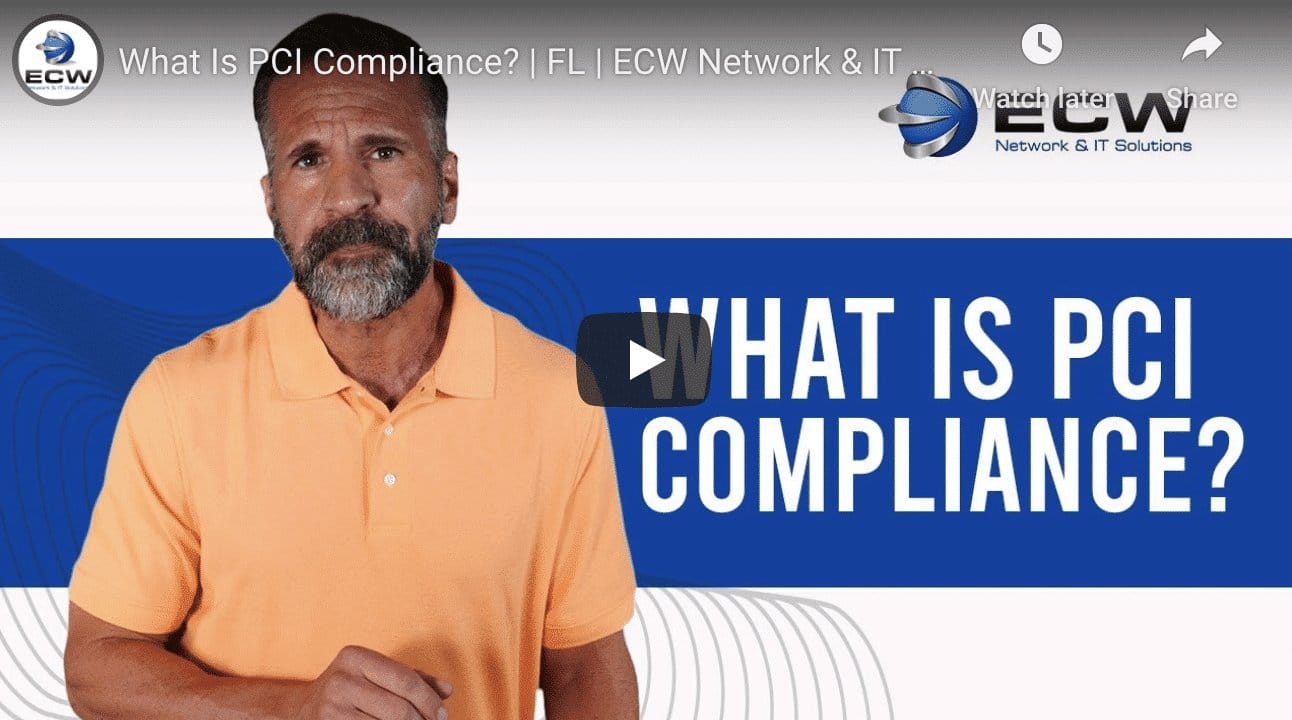
What Is PCI Compliance and How Can It Protect Your Business?
What Is PCI Compliance?
Are you concerned that your company may be vulnerable to compromised credit card data? It could ruin your good standing in the community, but you could also be subject to lost accounts, government fines, and worse. Who is making sure that you are PCI compliant? ECW (Electronic Commerce World) can help you maintain PCI compliance, but what is PCI compliance?
What Does PCI Compliance Mean?
Credit card companies want to ensure the security of transactions that merchants and businesses like yours process daily. Because of this, the card companies mandate their PCI compliance. This mandate greatly reduces the chances that cardholders will have their data stolen.
Merchants and businesses that are not PCI compliant could easily allow their customers’ information to be hacked and be used in a broad number of fraudulent ways. Being PCI compliant is defined as closely and consistently following a set of guidelines mandated by the PCI Standards Council. The council was created in 2006 to manage credit card security.
What Are the PCI Guidelines?
These guidelines are known as the PCI DSS (Payment Card Industry Data Security Standards). While there are 12 key requirements, 78 base requirements, and over 400 test procedures, there are essentially only six major objectives or security best practices.
- Build and maintain a secure network.
- Install and maintain a firewall configuration to protect cardholder data.
- Do not use vendor-supplied defaults for system passwords and other security parameters.
- Protect cardholder data.
- Protect stored cardholder data.
- Encrypt transmission of cardholder data across open, public networks.
- Maintain a vulnerability management program.
- Use and regularly update anti-virus software or programs.
- Develop and maintain secure systems and applications.
- Implement strong access control measures.
- Restrict access to cardholder data by business need-to-know.
- Assign a unique ID to each person with computer access.
- Restrict physical access to cardholder data.
- Regularly monitor and test networks.
- Track and monitor all access to network resources and cardholder data.
- Regularly test security systems and processes.
- Maintain an information security policy.
- Maintain a policy that addresses information security for employees and contractors.
What Does PCI Compliance Mean for My Business?
All merchants and businesses that process credit cards must be PCI compliant per their card processing agreement.
PCI compliance means great things for your business. It means trust-building with your customers. It means that your upstanding reputation stays intact. Your company’s technology will also be safe. As well, it will be easier to comply with SOX, HIPPA, and so forth.
If you don’t comply, you can get those huge fines or even be sued. There are essentially three steps to consistently keeping PCI compliant.
- Assess: Assess your network and IT resources for vulnerabilities. Constantly monitor access and usage of cardholder data. Log data must be available for analysis.
- Remediate: Fix vulnerabilities that threaten unauthorized access to cardholder data.
- Report: Report compliance and present evidence that data protection controls are in place.
What Can I Do To Keep PCI Compliant?
It seems like a daunting task for the average business, and for most, it is. However, that is why IT MSPs (managed service providers) like ECW exist. Your business has a specialty. Your IT network is the specialty of an IT MSP.
ECW ensures your network’s stability and compliance and safeguards your precious data and technology. We monitor your systems constantly and keep up with preventative maintenance. We are here to support your business and give you peace of mind about your PCI compliance and all of your company’s data. Let ECW protect your business.





